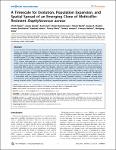A Timescale for Evolution, Population Expansion, and Spatial Spread of an Emerging Clone of Methicillin-Resistant Staphylococcus aureus
Nübel, Ulrich
Dordel, Janina
Kurt, Kevin
Strommenger, Birgit
Westh, Henrik
Shukla, Sanjay K.
Zemličková, Helena
Leblois, Raphaël
Wirth, Thierry
Jombart, Thibaut
Balloux, François
Witte, Wolfgang
Due to the lack of fossil evidence, the timescales of bacterial evolution are largely unknown. The speed with which genetic change accumulates in populations of pathogenic bacteria, however, is a key parameter that is crucial for understanding the emergence of traits such as increased virulence or antibiotic resistance, together with the forces driving pathogen spread. Methicillin-resistant Staphylococcus aureus (MRSA) is a common cause of hospital-acquired infections. We have investigated an MRSA strain (ST225) that is highly prevalent in hospitals in Central Europe. By using mutation discovery at 269 genetic loci (118,804 basepairs) within an international isolate collection, we ascertained extremely low diversity among European ST225 isolates, indicating that a recent population bottleneck had preceded the expansion of this clone. In contrast, US isolates were more divergent, suggesting they represent the ancestral population. While diversity was low, however, our results demonstrate that the short-term evolutionary rate in this natural population of MRSA resulted in the accumulation of measurable DNA sequence variation within two decades, which we could exploit to reconstruct its recent demographic history and the spatiotemporal dynamics of spread. By applying Bayesian coalescent methods on DNA sequences serially sampled through time, we estimated that ST225 had diverged since approximately 1990 (1987 to 1994), and that expansion of the European clade began in 1995 (1991 to 1999), several years before the new clone was recognized. Demographic analysis based on DNA sequence variation indicated a sharp increase of bacterial population size from 2001 to 2004, which is concordant with the reported prevalence of this strain in several European countries. A detailed ancestry-based reconstruction of the spatiotemporal dispersal dynamics suggested a pattern of frequent transmission of the ST225 clone among hospitals within Central Europe. In addition, comparative genomics indicated complex bacteriophage dynamics.
Dateien zu dieser Publikation
Keine Lizenzangabe

